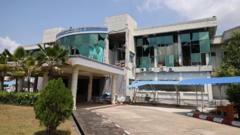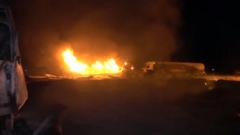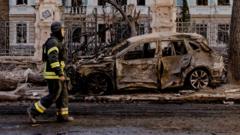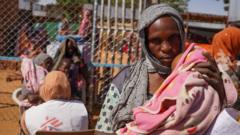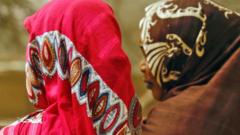Following a brutal attack by paramilitary forces, thousands of internally displaced individuals from Zamzam camp in Sudan have embarked on perilous journeys toward safety, grappling with loss, injury, and the dire need for humanitarian aid.
Fleeing Chaos: Sudanese Families Endure Harrowing Journeys for Safety
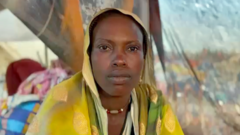
Fleeing Chaos: Sudanese Families Endure Harrowing Journeys for Safety
Thousands flee the Zamzam camp amid violence, enduring treacherous journeys and devastating losses.
In the wake of a deadly assault on the Zamzam camp, located in Sudan's Darfur region, countless families have found themselves in a desperate race for safety. With a population of around 700,000, Zamzam was already home to many of the world's most vulnerable people—those displaced by two decades of ongoing conflict. The latest attacks have sent shockwaves through the camp, as paramilitary forces known as the Rapid Support Forces (RSF) launched a violent bid for control over nearby el-Fasher.
Local officials have described Zamzam as “completely destroyed,” with health authorities stating that no one remains in the camp. Among those fleeing the chaos is 28-year-old Fathiya Mohammed, who left with her two children, a heartbreaking decision that came after losing her husband in the violence. "I was carrying one child on my back, another in my arms, and luggage on my head," she recounted, enduring a grueling four-day trek on foot to the nearby town of Tawila.
The journey has been fraught with peril, as many families have encountered additional threats along the way, including muggings by robbers. Medical aid organization Doctors Without Borders (MSF) reports that a staggering number of internally displaced individuals have inundated Tawila, seeking medical attention. Over two days, more than 20,000 people sought care, with many arriving with severe injuries from gunfire.
Witness accounts from survivors, including Issa Abdullah and Hussein Khamis, reveal the grim reality of the attacks, highlighting bullet injuries that have become alarmingly common among fleeing families. Khamis, who was shot in the leg, described the chaos of fleeing without support, underscoring the sheer desperation and fear present in this humanitarian crisis.
As families continue to arrive in Tawila, the hospitals are strained beyond capacity, struggling to treat the influx of patients. MSF's project coordinator, Marion Ramstein, noted that many injured individuals were left behind due to the difficulty of making the journey, exacerbating the humanitarian crisis faced by those impacted by the attacks.
The RSF and Sudanese army have been entangled in brutal conflict, marking a significant shift in power dynamics in Sudan. With control over much of western Sudan, including Darfur, the RSF's agenda poses risks of further fragmentation within the country.
Despite the overwhelming odds, those like Fathiya Mohammed cling to a glimmer of hope, echoing a unified plea for an end to the violence: “We want the war to stop. Peace is the most important thing.” In a region already scarred by years of conflict, the future remains uncertain as families adjust to life on the run.
Local officials have described Zamzam as “completely destroyed,” with health authorities stating that no one remains in the camp. Among those fleeing the chaos is 28-year-old Fathiya Mohammed, who left with her two children, a heartbreaking decision that came after losing her husband in the violence. "I was carrying one child on my back, another in my arms, and luggage on my head," she recounted, enduring a grueling four-day trek on foot to the nearby town of Tawila.
The journey has been fraught with peril, as many families have encountered additional threats along the way, including muggings by robbers. Medical aid organization Doctors Without Borders (MSF) reports that a staggering number of internally displaced individuals have inundated Tawila, seeking medical attention. Over two days, more than 20,000 people sought care, with many arriving with severe injuries from gunfire.
Witness accounts from survivors, including Issa Abdullah and Hussein Khamis, reveal the grim reality of the attacks, highlighting bullet injuries that have become alarmingly common among fleeing families. Khamis, who was shot in the leg, described the chaos of fleeing without support, underscoring the sheer desperation and fear present in this humanitarian crisis.
As families continue to arrive in Tawila, the hospitals are strained beyond capacity, struggling to treat the influx of patients. MSF's project coordinator, Marion Ramstein, noted that many injured individuals were left behind due to the difficulty of making the journey, exacerbating the humanitarian crisis faced by those impacted by the attacks.
The RSF and Sudanese army have been entangled in brutal conflict, marking a significant shift in power dynamics in Sudan. With control over much of western Sudan, including Darfur, the RSF's agenda poses risks of further fragmentation within the country.
Despite the overwhelming odds, those like Fathiya Mohammed cling to a glimmer of hope, echoing a unified plea for an end to the violence: “We want the war to stop. Peace is the most important thing.” In a region already scarred by years of conflict, the future remains uncertain as families adjust to life on the run.

